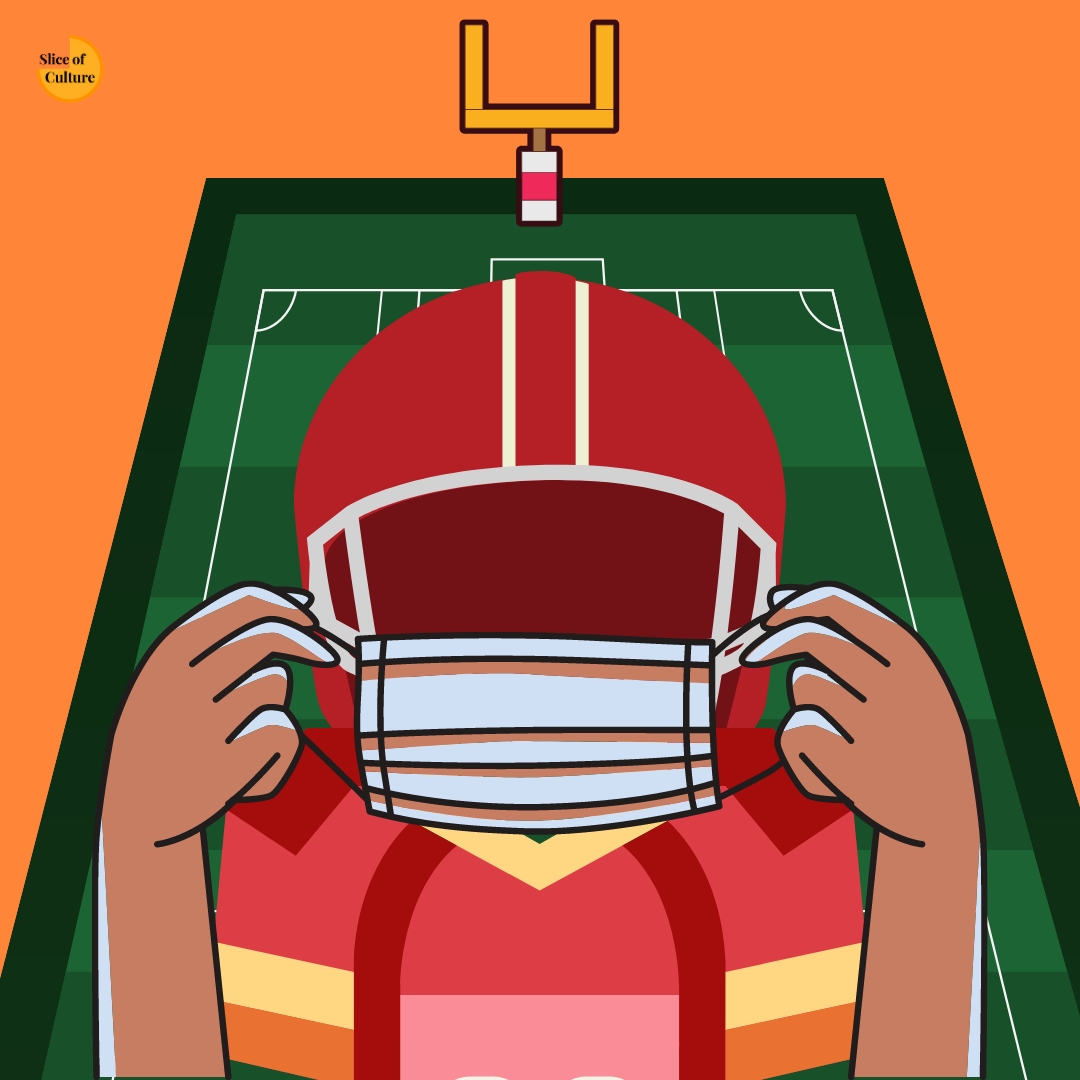In the midst of an international pandemic, the state of New Jersey is allowing high school football to be played this fall. With the green light to play, multiple schools in Jersey City will take the field, but are they prepared for the challenges that lie ahead?
On an early fall afternoon in Jersey City, Hudson Catholic’s high school football team is in full pads practicing for their first game of the season against North Bergen.
Running backs and receivers are on the field practicing plays against one another and the offensive linemen are twenty yards off to the sideline working on technique drills. At first glance, it looks like your quintessential high school football practice, but the coaches yell orders to their players under a mask. The team designated athletic trainer was also sporting a mask. Players who were not participating in any action were also — you guessed it — wearing a mask.
This is the new normal that coaches and players are experiencing — all to make sure their season is played despite COVID-19, a highly contagious virus that has killed over 200,000 Americans as of October 2020.
With the approval from the state to play fall football, the players and coaches in Jersey City are anxious to compete, but are they ready for the challenges that a COVID season holds?
In 37 out of 50 states, high school football will be played this fall. New Jersey is one of the 37 that were approved.
The news of a fall season led many to rejoice, especially those in the sports community. In late August, the New Jersey State Interscholastic Athletic Association’s (NJSIAA) released its Return to Sports plan, which provides detailed schedules for fall and winter sports.
A different season for 2020
In regards to football, the Super Football Conference — which is the governing body to 112 New Jersey high school football teams — released its revised schedule in late August. The condensed season will feature a six-game regular season and two bowl games; no playoffs or championships.
The new season format has not dampened the excitement for Saint Peter’s Preparatory school in Jersey City. The 2019 defending state champions are happy to be playing.
“Whatever season we have we are seeing it as a blessing,” said Rich Hansen Jr., a defensive Coordinator for Saint Peter’s Prep.
Despite the fact that they cannot defend their title this year, they are not taking anything for granted.
“..When we play our opener it can be more exciting and have a lot more meaning to it,” he added.
Even though teams are grateful to be playing, that does not mean they are unaware of the difficult position they are in with this season.
The NJSIAA mandated that practices start Sept. 14th, and not anytime before. For a team like Saint Peter’s Prep — who had to play their first scrimmage on Oct. 2nd, the first official day of games — that lack of preparation can be difficult from a coaching standpoint.
“It has been really difficult,” Hansen said. “In March we started to have conversations of what is the worst-case scenario… I could see us having three weeks to prepare for a game — two weeks and a game week, and that’s actually what we are dealing with now.”
The preseason is very precious for coaches and players. Players have to prepare their bodies for the physical toll of the season and also memorize the playbook. Usually, this happens in the summer before school when players have more time for themselves.
But given the circumstances, they have lost that luxury. Players now have to focus on preparing for the season on top of their academic coursework.
Hansen, of Saint Peter’s Prep, seemed sympathetic to this potential issue. His remedy was talking to players virtually through Zoom over the offseason.
“My initial concern was the welfare of the kids, making sure we were doing check-ins, team building, connecting with the kids,” he continued. “We’ve been trying team building plus meetings over the last six months.”
The SPP football program hopes that level of preparation will serve them well in the season. But other programs still face an uphill battle when devising a game plan for the season.
Coach Chris Johnstone of Hudson Catholic talks about how he had to adapt to the quick timeframe.
“The approach for me, personally, is what is going to hurt us the least if we don’t spend time on it right now?”
Coaches hope that prioritizing more essential aspects of football will cover up for the lack of time spent in other areas.
Coaches and players have bought in on this makeshift fall season, but there is no doubt that this season has been expedited due to the respiratory infection.
According to the NJSIAA COVID Return to Sports plan, the regular season will be from the beginning of Oct. 2 to Nov. 7. The postseason is from Nov. 13 to 22.
Given how rushed this season is, it begs the question: would it have been better for everyone involved to have the season postponed until Spring 2021? It would give more schools time to prepare for the season and students would have more of a chance to experience a normal season than the one they’re now.
But Johnstone disagrees, and Hansen echoes a similar position.
“I am firmly in the camp that says we did the right thing going now because I just don’t know what the future holds.”
“Moving it to the spring has a lot of other implications,” Hansen added. “And (there is not) a guarantee that we will be in a good play in the spring.”
For coaches, it seems that fear of another outbreak has made them adopt the position to finish the season as soon as possible. A spring season may create some discomfort for the potential unknown, but it also provides more time for possible COVID testing implementation.
It’s about the money
Shortened seasons during COVID have been embraced by professional and college sports. But the caveat is they are revenue-generating and allows them to conduct consistent and accurate testing.
Universities also have the means to provide COVID testing, but many of them cannot provide consistent testing needed to detect the virus in their athletes.
This conundrum has caused universities to cancel their fall sports season. If these universities are struggling to test then how are local high schools, with considerably fewer resources, going to do the same?
In Jersey City, the answer is, they just don’t.
I asked an Athletic Operations Official of a Jersey City high school — who asked to be anonymous — how often their players and coaches get tested.
“They do not get tested,” he said. “Everyone gets their temperature taken everyday…. The athletes have to take a pre-screened COVID survey every day and if something is wrong they are not allowed to come to practice.”
I asked Hansen the same question.
“That’s where high schools are lagging behind…,” he said. “Testing is more of looking for symptoms and educating our players.”
If a distinguished private school such as Saint Peter’s Prep — whose annual tuition for each student is $19,456 — can’t afford to test regularly then how can the public schools in Jersey City attempt to do so with considerably fewer resources?
Schools have decided they are not providing COVID-19 tests for their athletes, but instead temperature screenings and enforcing face masks.
According to the Food Drug Administration (FDA) website, it states “some studies suggest that temperature measurements alone may miss more than half of infected people… An elevated temperature is one way to identify a person who may have a COVID-19 infection, although an infected person may be contagious without elevated temperature or other easily detectable symptoms.”
The problem with temperature screenings is that they are not specific. Elevated body temperature can be caused by components other than COVID-19.
If a player or a coach were to test positive, the coaches and athletic officials would adhere to the protocols set forth by the NJSIAA.
The protocols are:
- An infected person should quarantine immediately for 14 days from the first day of symptoms or day of positive test.
- Infected person should contact their doctor and school Pandemic Response Team ASAP.
- Any student or coach in close contact with the infected person two days prior to symptoms/positive test, must also quarantine for 14 days and monitor their symptoms.
- Team play may continue.
But football is a contact sport
There is no way to socially distance yourself on the playing field.
The inherent nature of the sport is opposing sides colliding with one another to prevent each side from scoring points. Players do not wear masks on the field because it can inhibit breathing.
If a player or coach tests positive, and those close to them also have to quarantine, then practically the entire team and staff would have to recuse themselves from playing.
If two or more coaches or players on the same team test positive within 14 days of each other, they must consider shutting down the team for two weeks based on the investigation of the school’s pandemic response team.
But it’s a consideration to shut down the team, not a requirement.
According to NJ.com, 24 schools in the state had to postpone before their first game due to COVID-19 cases.
So why have a high school football season if there is a lack of testing for student-athletes and there have been positive cases that have caused teams to prematurely postpone their games?
Unlike the National Football League and the Power 5 College Football teams who bring in millions of dollars, Jersey City high school football is not a revenue-generating sport and it does not provide money to the school or its surrounding communities.
Johnstone believes high school football needs to be played because of the life lessons the sport teaches you.
“So many different ways young people grow and a major component of that is participation in athletics…,” he said. “The evolution of growth that you go through as an individual just by showing up every day and working to get better at something.”
While observing the Hudson Catholic football team practice with Snyder High School on the other half, I counted over fifty players and coaches total on the team.
When the coach called for the end of practice, the players huddled up around each other and took a knee while the head coach preached to them. I couldn’t hear him speak. They were too far off in the distance.
As the players looked up to the coach, I could only imagine he was lecturing them on accountability and responsibility and the importance of those traits. I hope that any coach or adult reciting those traits to a young person reflects upon their own words and how they are putting it into action.
As the players dispersed from the coaches’ speech, they seemed genuinely happy to be around each other.
A very tight group of young men, under most circumstances that would serve them well, but as I watched the players partake in the usual athletic rituals of hugging, handshaking, and congratulating one another I thought to myself I wish they weren’t so close.



A wonderful piece written with the knowledge of NJ high school sports programs; a keen incite into the preparation required to play the game of football and empathy for all who are willing to participate during these trying times of Covid-19.